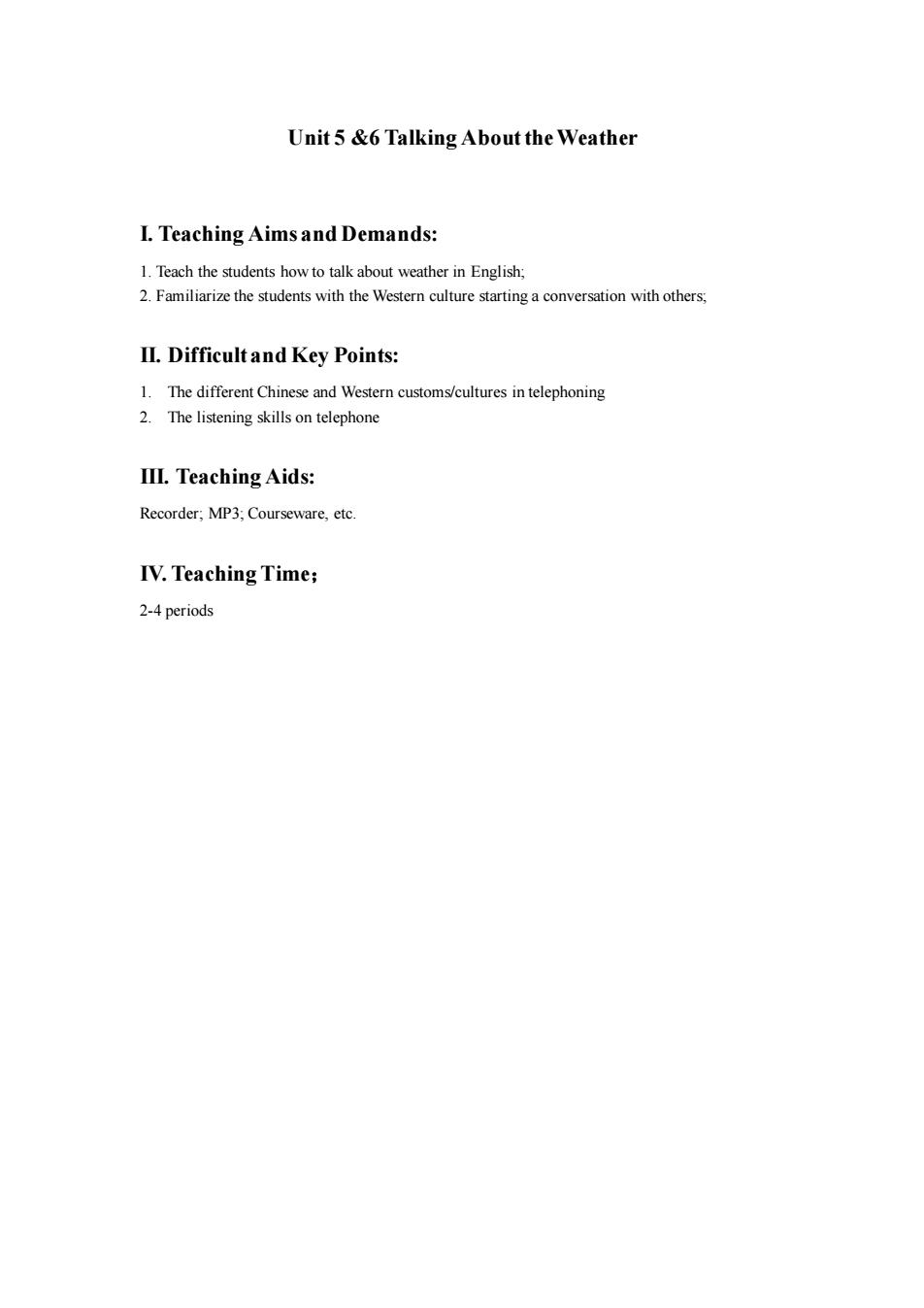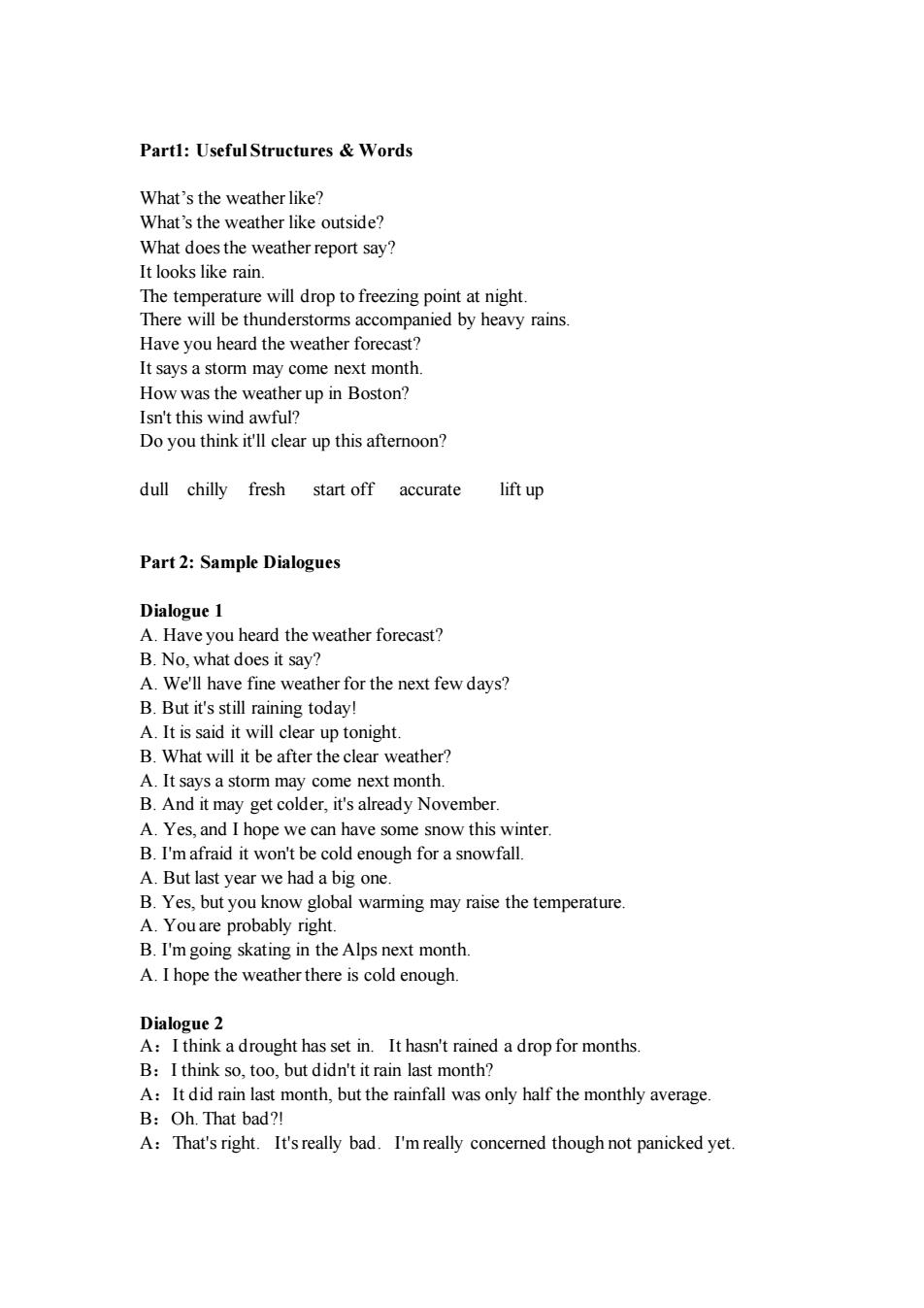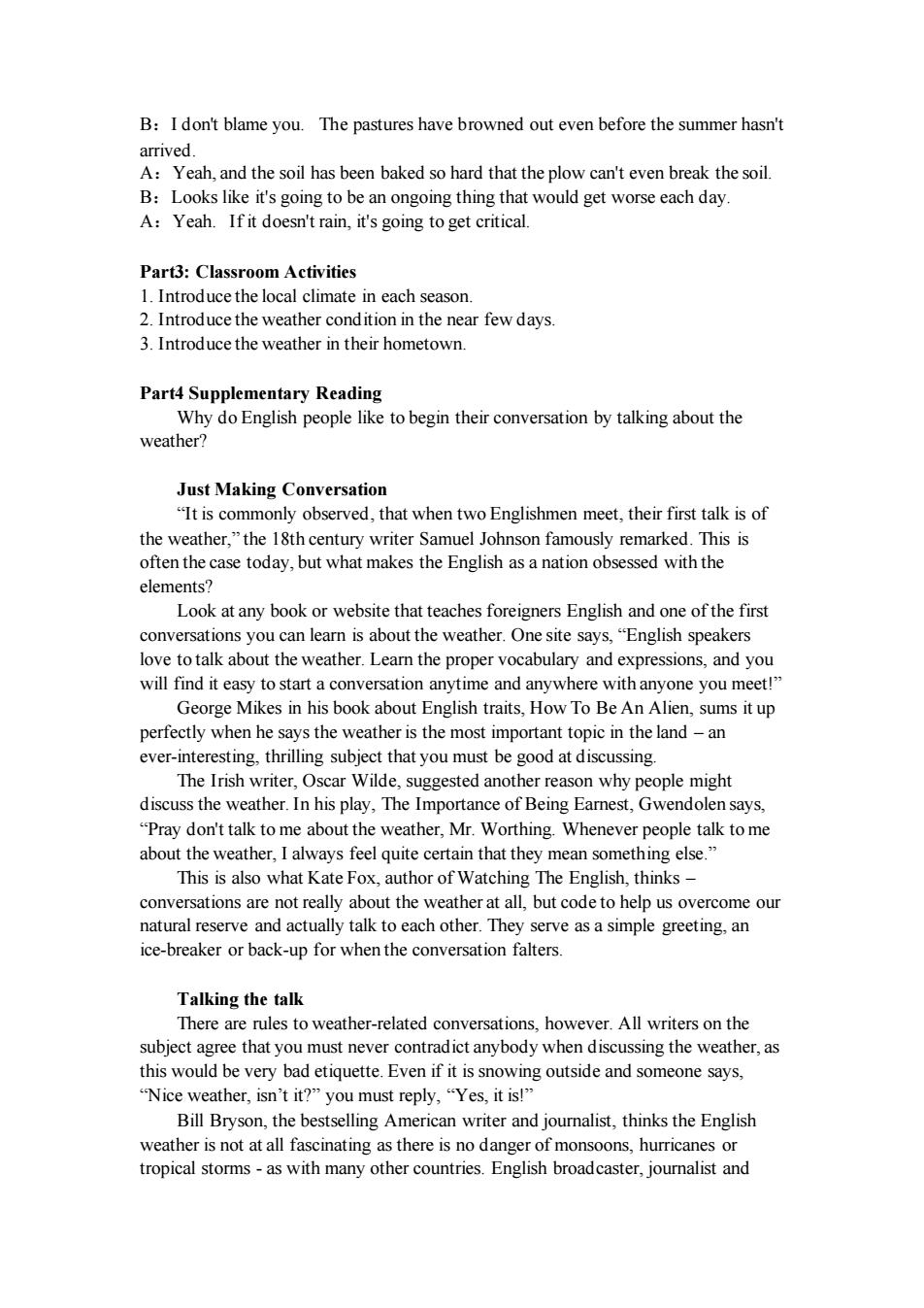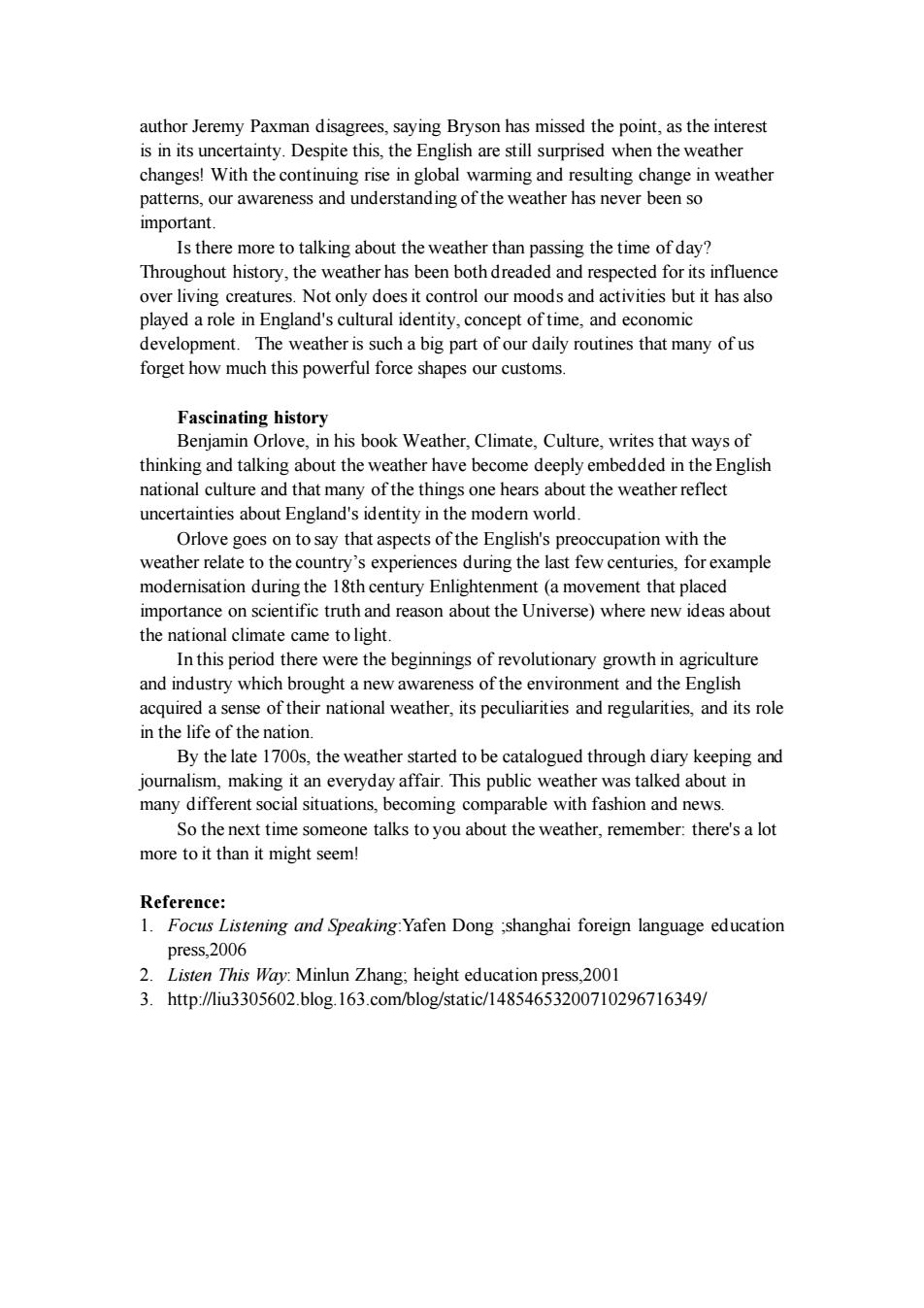
Unit 5 &6 Talking About the Weather I.Teaching Aimsand Demands: 1.Teach the students how to talk about weather in English 2.Familiarize the students with the Western culture starting a conversation with others II.Difficultand Key Points: 1.The different Chinese and Western customs/cultures in telephoning 2.The listening skills on telephone III.Teaching Aids: Recorder;MP3;Courseware,etc. IV.Teaching Time; 2-4periods
Unit 5 &6 Talking About theWeather I. Teaching Aims and Demands: 1. Teach the students how to talk about weather in English; 2. Familiarize the students with the Western culture starting a conversation with others; II. Difficult and Key Points: 1. The different Chinese and Western customs/cultures in telephoning 2. The listening skills on telephone III. Teaching Aids: Recorder; MP3; Courseware, etc. IV. Teaching Time; 2-4 periods

Part1:Useful Structures Words What's the weather like? What's the weather like outside? What does the weather report say? It looks like rair There will be thunderstorms accompanied by heavy rains Have you heard the weather forecast? It says a storm may come next month How was the weather up in Boston? Isn't this vind dull chilly fresh start off accurate lift up Part 2:Sample Dialogues Dialogue 1 A.Have you heard the weather forecast? B.No,what does it say? e weather for the next few days? A.It is said it will clear up tonight. B.What will it be after the clear weather? A.It says a storm may come next month. B.And it A.Yes,and I hope we can have some snow this winter B.I'm afraid it won't be cold enough for a snowfall. A.But last year we had a big one. B.Yes,but you know global warming may raise the temperature. a Youare probably right B.I'mgoing skating in the Alps next month A.I hope the weather there is cold enough. Dialogue 2 A:I think a drought has set in.It hasn't rained a drop for months B:Ithink so too but didn't it rain last month? A:It did rain last month,but the rainfall was only half the monthly average B:Oh.That bad?! A:That's right.It's really bad.I'm really concerned though not panicked yet
Part1: Useful Structures & Words What’s the weather like? What’s the weather like outside? What does the weather report say? It looks like rain. The temperature will drop to freezing point at night. There will be thunderstorms accompanied by heavy rains. Have you heard the weather forecast? It says a storm may come next month. How was the weather up in Boston? Isn't this wind awful? Do you think it'll clear up this afternoon? dull chilly fresh start off accurate lift up Part 2: Sample Dialogues Dialogue 1 A. Have you heard the weather forecast? B. No, what does it say? A. We'll have fine weather for the next few days? B. But it's still raining today! A. It is said it will clear up tonight. B. What will it be after the clear weather? A. It says a storm may come next month. B. And it may get colder, it's already November. A. Yes, and I hope we can have some snow this winter. B. I'm afraid it won't be cold enough for a snowfall. A. But last year we had a big one. B. Yes, but you know global warming may raise the temperature. A. You are probably right. B. I'm going skating in the Alps next month. A. I hope the weather there is cold enough. Dialogue 2 A:I think a drought has set in. It hasn't rained a drop for months. B:I think so, too, but didn't it rain last month? A:It did rain last month, but the rainfall was only half the monthly average. B:Oh. That bad?! A:That's right. It's really bad. I'm really concerned though not panicked yet

B:I don't blame you.The pastures have browned out even before the summer hasn't B:Looks like it's going to be an ongoing thing that would get worse each day. A:Yeah.If it doesn't rain,it's going to get critical. Part3:Classroom Activities 1.Introduce the local climate in each season. 2.Introduce the weather condition in the near few days. 3.Introduce the weather in their hometown. Part4 SupP olementary Readin Why do English people like to begin their conversation by talking about the weather? Just Making Conversation "It is commonly observed,that when two Englishmen meet,their first talk is of the weather,"the 18th century writer S amuel Johnson famously remarked.This is often the case today,but what makes the English as a nation obsessed with the elements? Look at any book or website that teaches foreigners English and one of the first conversations you can learn is about the weather.One site says,"English speakers love to talk ab t the e weather.Leam the proper vocabulary and expressio ons,and yo George Mikes in his book about English traits,How To Be An Alien,sums it up perfectly when he says the weather is the most important topic in the land-an ever-interesting.thrilling subiect that you must be good at discussing. The Irish vriter Oscar wilde s uggested anothe Gendo ople might discuss the we ather.In his play.The Impo a ce of Being E n says "Pray don't talk to me about the weather,Mr.Worthing.Whenever people talk to me about the weather,I always feel quite certain that they mean something else. This is also what Kate Fox,author of Watching The English,thinks- conversations are not really about the weather at all,but code to help us overcome our ally talk toe ach other.They serve as a simple greeting.an Talking the talk There are rules to weather-related conversations,however.All writers on the subject agree that yo must n ve contradic anybody when dis ssing the eather.as this would be very ba d etiquette.Even if it is snowing outside and someone says, "Nice weather.isn't it?"you must reply."Yes,it is! Bill Bryson,the bestselling American writer and journalist,thinks the English weather is not at all fascinating as there is no danger of monsoons,hurricanes or tropical storms-as with many other countries.English broadcaster.joumalist and
B:I don't blame you. The pastures have browned out even before the summer hasn't arrived. A:Yeah, and the soil has been baked so hard that the plow can't even break the soil. B:Looks like it's going to be an ongoing thing that would get worse each day. A:Yeah. If it doesn't rain, it's going to get critical. Part3: Classroom Activities 1. Introduce the local climate in each season. 2. Introduce the weather condition in the near few days. 3. Introduce the weather in their hometown. Part4 Supplementary Reading Why do English people like to begin their conversation by talking about the weather? Just Making Conversation “It is commonly observed, that when two Englishmen meet, their first talk is of the weather,” the 18th century writer Samuel Johnson famously remarked. This is often the case today, but what makes the English as a nation obsessed with the elements? Look at any book or website that teaches foreigners English and one of the first conversations you can learn is about the weather. One site says, “English speakers love to talk about the weather. Learn the proper vocabulary and expressions, and you will find it easy to start a conversation anytime and anywhere with anyone you meet!” George Mikes in his book about English traits, How To Be An Alien, sums it up perfectly when he says the weather is the most important topic in the land – an ever-interesting, thrilling subject that you must be good at discussing. The Irish writer, Oscar Wilde, suggested another reason why people might discuss the weather. In his play, The Importance of Being Earnest, Gwendolen says, “Pray don't talk to me about the weather, Mr. Worthing. Whenever people talk to me about the weather, I always feel quite certain that they mean something else.” This is also what Kate Fox, author of Watching The English, thinks – conversations are not really about the weather at all, but code to help us overcome our natural reserve and actually talk to each other. They serve as a simple greeting, an ice-breaker or back-up for when the conversation falters. Talking the talk There are rules to weather-related conversations, however. All writers on the subject agree that you must never contradict anybody when discussing the weather, as this would be very bad etiquette. Even if it is snowing outside and someone says, “Nice weather, isn’t it?” you must reply, “Yes, it is!” Bill Bryson, the bestselling American writer and journalist, thinks the English weather is not at all fascinating as there is no danger of monsoons, hurricanes or tropical storms - as with many other countries. English broadcaster, journalist and

author Jeremy Paxman disagrees,saying Bryson has missed the point,as the interest is in its uncertainty.Despite this,the English are still surprised when the weather changes!With the continuing rise in global warming and resulting change in weather patterns,our awareness and understanding of the weather has never been so important. Is there more to talking about the weather than passing the time of day? Throughout history,the weather has been both dreaded and respected for its influence over living creatures.Not only does it control our moods and activities but it has also played a role in England's cultural identity,concept of time,and economic development.The weather is such a big part of our daily routines that many of us forget how much this powerful force shapes our customs. Fascinating history Benjamin Orlove,in his book Weather,Climate,Culture,writes that ways of thinking and talking about the weather have become deeply embedded in the English national culture and that many of the things one hears about the weather reflect uncertainties about England's identity in the modern world. Orlove goes on to say that aspects of the English's preoccupation with the weather relate to the country's experiences during the last few centuries,for example modernisation during the 18th century Enlightenment(a movement that placed importance on scientific truth and reason about the Universe)where new ideas about the national climate came to light. In this period there were the beginnings of revolutionary growth in agriculture and industry which brought a new awareness of the environment and the English acquired a sense of their national weather,its peculiarities and regularities,and its role in the life of the nation. By the late 1700s,the weather started to be catalogued through diary keeping and journalism,making it an everyday affair.This public weather was talked about in many different social situations,becoming comparable with fashion and news. So the next time someone talks to you about the weather,remember:there's a lot more to it than it might seem! Reference: 1.Focus Listening and Speaking:Yafen Dong ;shanghai foreign language education press,2006 2.Listen This Way:Minlun Zhang;height education press,2001 3.http:liu3305602.blog163.com/blog/static/14854653200710296716349/
author Jeremy Paxman disagrees, saying Bryson has missed the point, as the interest is in its uncertainty. Despite this, the English are still surprised when the weather changes! With the continuing rise in global warming and resulting change in weather patterns, our awareness and understanding of the weather has never been so important. Is there more to talking about the weather than passing the time of day? Throughout history, the weather has been both dreaded and respected for its influence over living creatures. Not only does it control our moods and activities but it has also played a role in England's cultural identity, concept of time, and economic development. The weather is such a big part of our daily routines that many of us forget how much this powerful force shapes our customs. Fascinating history Benjamin Orlove, in his book Weather, Climate, Culture, writes that ways of thinking and talking about the weather have become deeply embedded in the English national culture and that many of the things one hears about the weather reflect uncertainties about England's identity in the modern world. Orlove goes on to say that aspects of the English's preoccupation with the weather relate to the country’s experiences during the last few centuries, for example modernisation during the 18th century Enlightenment (a movement that placed importance on scientific truth and reason about the Universe) where new ideas about the national climate came to light. In this period there were the beginnings of revolutionary growth in agriculture and industry which brought a new awareness of the environment and the English acquired a sense of their national weather, its peculiarities and regularities, and its role in the life of the nation. By the late 1700s, the weather started to be catalogued through diary keeping and journalism, making it an everyday affair. This public weather was talked about in many different social situations, becoming comparable with fashion and news. So the next time someone talks to you about the weather, remember: there's a lot more to it than it might seem! Reference: 1. Focus Listening and Speaking:Yafen Dong ;shanghai foreign language education press,2006 2. Listen This Way: Minlun Zhang; height education press,2001 3. http://liu3305602.blog.163.com/blog/static/14854653200710296716349/